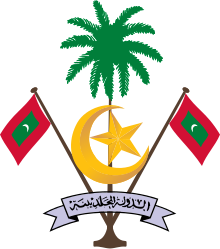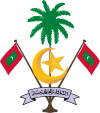Gaumee Salaam
| English: National Salute | |
|---|---|
| ޤައުމީ ސަލާމް | |
 | |
National anthem of the Maldives | |
| Lyrics | Muhammad Jameel Didi, 1948 |
| Music | Pandit W. D. Amaradeva, 1972 |
| Adopted | 1905 |
| Readopted | 1972 |
| Audio sample | |
U.S. Navy Band instrumental rendition in C major | |
"Gaumee salaam" (Dhivehi: ޤައުމީ ސަލާމް, IPA: [gaʊmiː s̺alaːm]; lit. 'National Salute') is the national anthem of the Maldives. The lyrics were written by Muhammad Jameel Didi in 1948, and the melody was composed by Sri Lankan maestro Pandit Amaradeva in 1972.[1]
"Gaumee salaam" is a declaration of national unity, the Islamic faith, the victory of historic battles, and an homage to the heroes who fell defending the nation. It also wishes further development on the country, while paying respect to the country's leaders.
History
[edit]Until 1948, a melody without lyrics called the Salaamati was performed by a royal band on state occasions at the Eterekoilu, the residence of the Sultan. Soon after, it was decided that the Salaamati needed lyrics accompanied by a new melody. The lyrics were written by a young poet and later chief justice, Mohamed Jameel Didi.[1][2]
Jameel Didi wrote the words for the new Salaamathi bearing in mind the influence of Urdu poetry during the time, closely imitating its style and also furnishing his work with words borrowed from Arabic. Afterwards, Jameel Didi began looking for a tune to accompany his poem when he heard the noon chime ("Auld Lang Syne") of his uncle's clock. The tune was adopted to the lyrics, and the new Salaamathi was complete.[1][2]
Throughout the 1950s and 1960s, Maldivians became more aware of the importance of a national anthem, and in 1972, shortly before the Maldives was visited by Queen Elizabeth II, the government hastily commissioned Sri Lankan maestro W. D. Amaradeva for a new melody for the anthem.[1][2][3] The original lyrics were retained, with a few changes to emphasise the fact that Maldives had been a republic since 1968.[2] As of 2022[update], this version of the anthem has survived without any modifications.
Lyrics
[edit]Normally, only the chorus and first two verses are sung.[4][5]
- Maldivian original
| Thaana[6] | Latin script | Arabic script | IPA transcription[a] |
|---|---|---|---|
ކޯރަސް |
Koaras: |
کورس: |
[koː.ɾas̺] |
| English translation |
|---|
Chorus: |
Notes
[edit]- ^ See Help:IPA and Maldivian phonology.
References
[edit]- ^ a b c d The World Factbook. Central Intelligence Agency. 2012. p. 461. ISBN 9780160911422.
- ^ a b c d "Maldive national anthem". Máldive Royal Family. Archived from the original on 2004-07-03. Retrieved 2022-02-04.
- ^ R. K. Radhakrishnan (28 June 2011). "India honours doyen of modern Sinhala music". The Hindu. Colombo. Retrieved 25 April 2013.
- ^ Television Maldives (2019-04-12). "National Anthem of Maldives". YouTube. Archived from the original on 2022-04-29. Retrieved 2022-02-04.
- ^ Television Maldives (2016-04-12). "National Anthem of Maldives - by #MaldivianIdol TOP5". YouTube. Archived from the original on 2022-04-29. Retrieved 2022-02-04.
- ^ "السلام الوطني المالديفي". areq.net. Retrieved 2022-02-04.
External links
[edit]- The Maldives Royal Family website has a page on the anthem, including a midi file version. (archived 1 January 2022)
- Streaming audio of the national anthem of the Maldives, with information and lyrics (archived 9 February 2018)

